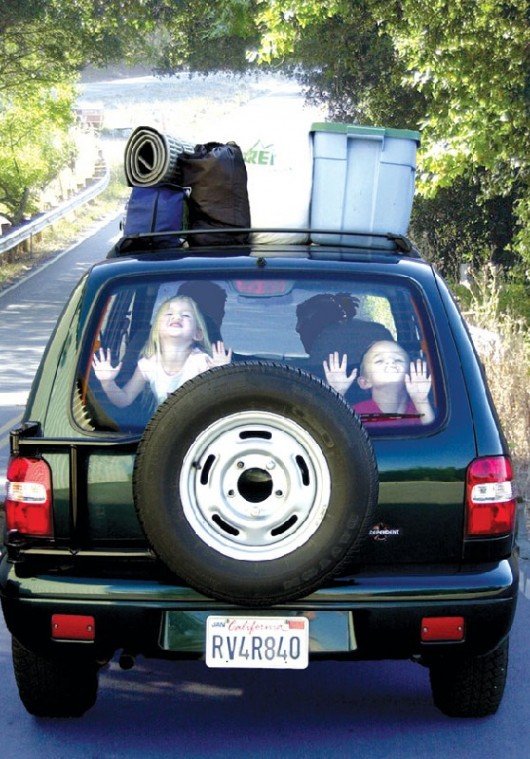It has been more than 20 years since the Griswold family set out
on their cross-country odyssey to Wally World in the film
”
National Lampoon’s Vacation,
”
but the iconic summer movie remains funny for one reason: it’s
so true.
It has been more than 20 years since the Griswold family set out on their cross-country odyssey to Wally World in the film “National Lampoon’s Vacation,” but the iconic summer movie remains funny for one reason: it’s so true.
Despite the advent of hand-held video games, in-car DVD players and dual zone climate control, parents preparing to take the wheel on family vacations this summer still know their R&R can quickly become hell on Earth. Cramped into closed quarters with family members they don’t usually see 24 hours a day, the kids begin to squabble, the parents begin to bicker and soon the relaxing getaway of the year is off to a bad beginning.
“Vacations are like holidays,” said Barry Goldman-Hall, clinical director of Community Solutions in Morgan Hill. “They have a lot of unrealistic expectations built into them of what this time is supposed to be. You’re together in a cramped area – either the car or a hotel room – and you’re spending all your time together, plus there’s a premium on having a good time. It adds to the tension.”
Before you find yourself yelling “Because I’m the parent!” at the top of your lungs while your eyes and the veins in the sides of your neck bulge, read up. You can survive your next vacation with a little pre-planning help from the South Valley’s family counselors.
Most families over-schedule, rush and restrict one another too much in their pursuit of good times, according to local experts. The seeds of a bad vacation, in fact, start before most families ever pack their bags or make their hotel reservations.
“People try to jam so much into nine or 10 days,” said Goldman-Hall. “But vacations that are planned down to the minute don’t become restful or relaxing. They become more work. You’re trying to get from one place to the next, and you’re not really enjoying the things you’ve planned on seeing because you’re thinking about not being late to the next stop.”
These types of vacations are also hard on children, since rushing between activities also means parents are less likely to stop for breaks along the road, said Vicky Tamashiro, assistant program director at Chamberlain’s Mental Health in Gilroy.
“Kids’ sense of time is not like adults,” said Tamashiro. “What seems to us like a 15- or 30-minute ride can seem like hours to them, and if you’re going somewhere like Disneyland that’s 9 or 10 hours away, it can seem like days.
“A lot of them are in car seats, too. I get uncomfortable in my seat belt, so imagine how smaller children feel when they’re completely strapped in.”
To keep kids happy while on the road, Tamashiro recommended playing car games (see box) or, on longer trips, allowing children to read, play personal video games or listen to CD players.
“It’s nice to have the kids bring along their special blanket or pillow if they like, so they’ll have something that’s theirs to lean on if they want to nap,” said Tamashiro. “And having food along helps, too. You can keep non-messy snacks like fruit or string cheese with you if you carry an ice chest or you can stop and snack frequently.”
Once you’ve reached your destination, you may also have reached the point where, having been cooped up in the car for hours on end, you’re ready to explode.
“You and the kids are usually at work or at school, so you’re used to seeing one another for 4 or 6 hours a day, if that,” said Goldman-Hall. “In most cases, when you get mad at each other, you can go in another room and cool off, but not in a hotel room, so even if you’re all together, you need to work in some individual activities for each member of the family.”
A child may wish to read or play video games for a short portion of the day, while an adult or teen may feel better after a walk around the hotel grounds on his or her own, said Goldman-Hall.
If your vacation revolves around family time, be sure to keep your distance, too.
“It may sound like a really good idea to you to meet up with your brother and his wife and kids to go camping, but if you live far away from one another and your children don’t know one another, it could be a bad idea,” said Tamashiro. “There’s that expectation that everyone is going to have fun, but your kids may not like their kids or your in-laws may not approve of your parenting style.”
To keep the peace between family members, stick to visits at first, Tamashiro said. If those go well, think about camping next year.
For strict peace of mind, experts agree, keep plans and expectations to a minimum. Besides, if you expect the worst, anything else is a step up.












